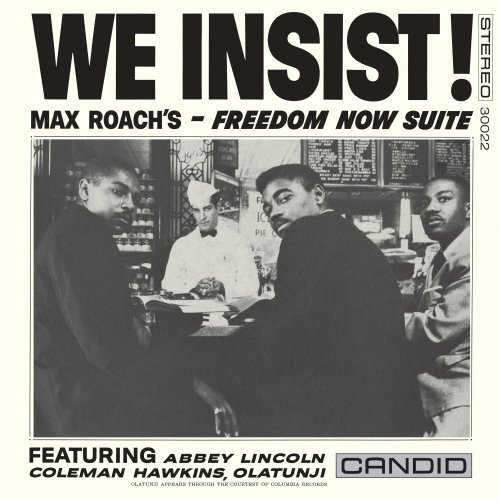
Max Roach - We Insist! Max Roach's Freedom Now Suite (Remastered) (2022)
BAND/ARTIST: Max Roach
- Title: We Insist! Max Roach's Freedom Now Suite
- Year Of Release: 1960
- Label: Candid
- Genre: Jazz
- Quality: FLAC (tracks) / 24bit-192kHz FLAC (tracks)
- Total Time: 37:13
- Total Size: 207 MB / 1.48 GB
- WebSite: Album Preview
Tracklist:
1. Driva'man (Remastered) (5:14)
2. Freedom Day (Remastered) (6:05)
3. Triptych: Prayer / Protest / Peace (Remastered) (8:06)
4. All Africa (Remastered) (8:03)
5. Tears For Johannesburg (Remastered) (9:47)
1. Driva'man (Remastered) (5:14)
2. Freedom Day (Remastered) (6:05)
3. Triptych: Prayer / Protest / Peace (Remastered) (8:06)
4. All Africa (Remastered) (8:03)
5. Tears For Johannesburg (Remastered) (9:47)
Review by Michael G. Nastos
We Insist! Max Roach's Freedom Now Suite, co-authored by Max Roach and Oscar Brown, Jr., was a pivotal work in the early-'60s African-American protest movement, and continues to be relevant in its message and tenacity. It represents a lesson in living as to how the hundreds of years prior were an unnecessary example of how oppression kept slaves and immigrants in general in their place. Vocalist Abbey Lincoln expresses this oppression as effectively as anyone could with her thespian-based wordless vocals, and lyrics written by Brown that tell the grim story of the struggle of African-American for far too long. Musically, Roach assembled one of the greatest bands, from his own emerging ensemble with trombonist Julian Priester and trumpeter Booker Little, to the legendary Coleman Hawkins and lesser-known, underappreciated tenor saxophonist Walter Benton. Percussionists Ray Mantilla and Michael Olatunji gave the poetic pieces sung by Lincoln enough substance and spice to also refer to Afro-Cuban and South American prejudice and urgency for change. Hawkins is particularly impressive, as his emotional range during the deep and dour, 5/4 slave song "Driva' Man" clearly feeds off of Lincoln's blues singing about quittin' time. "Triptych; Prayer/Peace/Protest" is the magnum opus of the set, introduced by Roach's signature drum moves, an eerie operatic vocal or oppressed angst yelling from Lincoln, and a 5/4 beat from the percussionist against a calmer vocal component, all written for interpretive dance. Of the modern jazz that Roach is renowned for, the horns jump into furious hard bop with solos from Little, Benton, and Priester on "Freedom Day" after Lincoln quietly invites you to "whisper/listen," while the obscure bassist James Schenck leads in 6/8 and 5/4 ostinato over Lincoln's sustained tones on "Tears for Johannesburg," with the layered horns in and out of well-wrought harmonies, and another triad of instrumental solos. "All Africa" sports lyrics about being on the beach, or maybe the beach head in the battle for freedom, as chants of tribal names echo similar village beats. This is a pivotal work in the discography of Roach and African-American music in general, its importance growing in relevance and timely, postured, real emotional output. Every modern man, woman, and child could learn exponentially listening to this recording -- a hallmark for living life.
We Insist! Max Roach's Freedom Now Suite, co-authored by Max Roach and Oscar Brown, Jr., was a pivotal work in the early-'60s African-American protest movement, and continues to be relevant in its message and tenacity. It represents a lesson in living as to how the hundreds of years prior were an unnecessary example of how oppression kept slaves and immigrants in general in their place. Vocalist Abbey Lincoln expresses this oppression as effectively as anyone could with her thespian-based wordless vocals, and lyrics written by Brown that tell the grim story of the struggle of African-American for far too long. Musically, Roach assembled one of the greatest bands, from his own emerging ensemble with trombonist Julian Priester and trumpeter Booker Little, to the legendary Coleman Hawkins and lesser-known, underappreciated tenor saxophonist Walter Benton. Percussionists Ray Mantilla and Michael Olatunji gave the poetic pieces sung by Lincoln enough substance and spice to also refer to Afro-Cuban and South American prejudice and urgency for change. Hawkins is particularly impressive, as his emotional range during the deep and dour, 5/4 slave song "Driva' Man" clearly feeds off of Lincoln's blues singing about quittin' time. "Triptych; Prayer/Peace/Protest" is the magnum opus of the set, introduced by Roach's signature drum moves, an eerie operatic vocal or oppressed angst yelling from Lincoln, and a 5/4 beat from the percussionist against a calmer vocal component, all written for interpretive dance. Of the modern jazz that Roach is renowned for, the horns jump into furious hard bop with solos from Little, Benton, and Priester on "Freedom Day" after Lincoln quietly invites you to "whisper/listen," while the obscure bassist James Schenck leads in 6/8 and 5/4 ostinato over Lincoln's sustained tones on "Tears for Johannesburg," with the layered horns in and out of well-wrought harmonies, and another triad of instrumental solos. "All Africa" sports lyrics about being on the beach, or maybe the beach head in the battle for freedom, as chants of tribal names echo similar village beats. This is a pivotal work in the discography of Roach and African-American music in general, its importance growing in relevance and timely, postured, real emotional output. Every modern man, woman, and child could learn exponentially listening to this recording -- a hallmark for living life.
Year 2022 | Jazz | FLAC / APE | HD & Vinyl
As a ISRA.CLOUD's PREMIUM member you will have the following benefits:
- Unlimited high speed downloads
- Download directly without waiting time
- Unlimited parallel downloads
- Support for download accelerators
- No advertising
- Resume broken downloads


